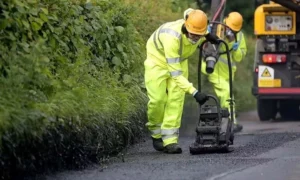Some contractors and suppliers have warned that some highway maintenance schemes could be delayed this season with prices going up as a result of supply challenges and spiralling costs.
Prices for most materials used for maintenance projects is an immediate problem with some suppliers further up the supply chain citing ‘Force Majeure’ for increases as a result of the war in Ukraine as well as other issues such as logistics problems. As a result, these companies have said it may be impossible to honour original agreed contract prices.
Also, diesel fuel has increased by 30-40p per litre on average, with price rises being witnessed daily. Contractors were already facing a further rise of 47p per litre from next month as a result of changes to the regulations regarding rebated fuel (Gas Oil) that will no longer be able to be used in specialised plant, bitumen sprayers, chipping spreaders etc. from 1st April 2022. This means a combined increase of around 87p per litre or nearly £4.00 per gallon.
Many maintenance vehicles and lorries only achieve 5-8 mpg, with the industry still in the early stages of converting to alternative fuel sources such as hydrogen and electric.
Potential supply challenges could also become an issue over the coming months.
Paul Boss, Chief Executive of the RSTA said: “This could not have come at a worse time for our Members and the surface treatments sector. The combined challenge of the war in Ukraine and on-going logistics problems means that the industry is facing a tough few months. Our Members will be doing everything they can to avoid passing on costs but this sadly may be inevitable in the short term.”
This week, the Mineral Products Association (MPA), whose members produce 400 million tonnes of materials for UK building and manufacturing each year, has written to the Chancellor in a last-ditch attempt to delay the removal of the gas oil rebate, as well as calling for urgent action on soaring energy costs and transparency on delivery of the Government’s infrastructure plans.
On 1st April 2022, mineral products companies are expecting to lose their right to use lower-tax gas oil fuel. With no low-carbon alternatives to the heavy machinery the industry uses, removing the rebate will achieve no reduction in carbon emissions for years to come. Given the rising levels of inflation, the MPA has asked for the tax change to be delayed until new alternative equipment becomes available.
The MPA appeal comes in the context of extremely volatile global energy markets following Russia’s invasion of Ukraine, exacerbating prices that were already approaching record highs. According to the MPA the UK’s energy intensive industries face higher costs than EU competitors because of policy choices made by the UK Government and Ofgem.
As a member of the Energy Intensive Users Group, MPA has been calling for action for months to tackle the domestic policies that push UK prices well above those in the EU, threatening the competitiveness of producers in the UK. MPA has repeated its request for the Chancellor to place UK industry on a level playing field with its European competitors.
Nigel Jackson, Chief Executive of MPA, said: “The high ambitions the Government has set out for the UK’s infrastructure and housing rely on our members’ ability to supply aggregates, asphalt, cement, concrete and other essential materials. You can’t build with thin air – construction needs materials and producing materials requires long-term planning and investment, so our industry needs clarity on what’s in the pipeline for the next 10 or 20 years, not the next 10 months. There is a widely recognised maxim ‘if you can’t grow it, you have to dig it’, clearly this is not as recognised by Government given the exemptions and subsidies some other industries enjoy. We also provide high-skill, well-paid jobs in regions most in need of economic growth.
However, for this year’s Spring Statement in March 2022, the priority must be the urgent measures to tackle domestic policy drivers of the UK’s high energy costs. The Chancellor has solutions in his power to place UK industry on a level playing field with European competitors and we urge him to act decisively this month”.





















